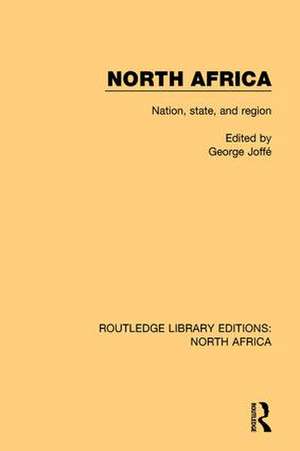North Africa: Nation, State, and Region: Routledge Library Editions: North Africa
Editat de George Jofféen Limba Engleză Paperback – 13 iun 2017
North Africa differs from the Middle East in several significant ways. It was subject to a uniform colonial experience as part of the French empire; its populations are far more culturally homogeneous than those of the Middle East; and, since the Reconquista, it has always been far more susceptible to European influences than has the Middle East. It has thus had a far better basis for regional integration and for effective state formation than has the Middle East itself.
In the post-Cold War world, North Africa took on a new significance for Europe as issues of migration and regional trade began to dominate the European agenda. This book, first published in 1993, endeavours to investigate the background to the political developments of modern North Africa. It not only looks at the pre-colonial past but also investigates the effect of the colonial period itself on the regional dimension in view of the creation of the UMA, a confederal regional organisation, in early 1989. The contributors to this volume are all people with long experience of the North African political and historical scene.
Preț: 357.43 lei
Nou
68.39€ • 71.41$ • 56.48£
Carte tipărită la comandă
Livrare economică 15-29 aprilie
Specificații
ISBN-10: 1138122742
Pagini: 322
Dimensiuni: 156 x 234 x 17 mm
Greutate: 0.48 kg
Ediția:1
Editura: Taylor & Francis
Colecția Routledge
Seria Routledge Library Editions: North Africa
Locul publicării:Oxford, United Kingdom
Public țintă
Postgraduate and UndergraduateCuprins
Descriere
North Africa differs from the Middle East in several significant ways. It was subject to a uniform colonial experience as part of the French empire; its populations are far more culturally homogeneous than those of the Middle East; and, since the Reconquista, it has always been far more susceptible to European influences than has the Middle East. It has thus had a far better basis for regional integration and for effective state formation than has the Middle East itself.
In the post-Cold War world, North Africa took on a new significance for Europe as issues of migration and regional trade began to dominate the European agenda. This book, first published in 1993, endeavours to investigate the background to the political developments of modern North Africa. It not only looks at the pre-colonial past but also investigates the effect of the colonial period itself on the regional dimension in view of the creation of the UMA, a confederal regional organisation, in early 1989. The contributors to this volume are all people with long experience of the North African political and historical scene.






